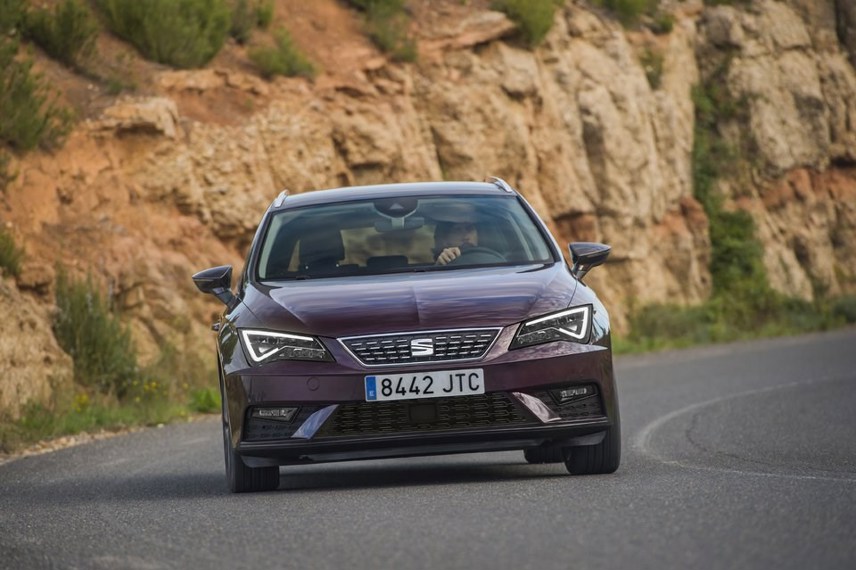Review
You might have to look quite closely to spot the changes Seat have made to its best-selling model, the Leon.
Look hard enough, though, and you’ll find the Spanish manufacturer has made effective use of the Volkswagen Group parts bin to bring the car up to date, and rectify some of the notable omissions to its interior specification.
The range is broadly similar, although the brand has added a new trim level to cater for those wanting more comfort than sport. Trims available include SE Technology, SE Dynamic Technology (which adds larger wheels), FR (the sporty edition), and the new Xcellence level, which was first introduced earlier in the year on the Ateca.
That trim adds new alloys with higher profile tyres, part leather seating and a suspension set up for comfort and ride quality.
Standard fit technology now includes an electronic handbrake and a larger 8.0" touchscreen. The touchscreen is high-res but the removal of buttons either side means drivers will take their eyes away from the road for longer.
A change in location of cupholders thanks to removal of the handbrake increases handy cubbyholes, but puts bottles squarely in the way of gear changes.
The rest of the interior, bar some different fabrics on the seats, remains unchanged.
Buyers can now also option keyless start, blind spot assist, traffic sign recognition, park assist, and pedestrian protection, as well as traffic jam assist on DSG models.
At some point next year, a digital dashboard, as seen on some models in the Audi and Volkswagen range, will be available as an option.
But while the technology has been improved, there have been some curious changes to the engine line-up in SE trims, where the bulk of fleet drivers are likely to sit.
The 94g/km 1.6-litre Ecomotive diesel is no longer available, so the lowest emitting vehicle in the range is now the 102g/km 1.0-litre three cylinder Ecomotive petrol.
From a driver's perspective, the 1.0-litre 110ps petrol powered Leon isn't a bad option.
It is quiet and offers ample power, and unlike the new 107g/km 115ps 1.6-litre base diesel, offers a six speed transmission, making motorway journeys easier. It's worth noting that both these engines are only available on the SE trims.
It achieves 64.2mpg, with the diesel offering only slightly more at 67.3mpg.
BIK is £174 lower than the diesel per year for a 20% taxpayer, and the expected cost-per-mile difference is just 0.02p per mile.
To drive, the Leon remains as good as it did before its facelift – handling well on the twisty mountain roads around Barcelona, with smooth gear changes and a comfortable if basic seating position.
Visibility is good, and all the essential controls are easily to hand.
The diesel is still a good choice, but the figures mean that there is more incentive for a driver to at least consider a petrol.
Author:
Christopher Smith
Specs
| Manufacturer | SEAT |
| Model | Leon |
| Specification | Leon Hatch 5Dr 1.0TSi Eco 115 SS SE Technology 6 17MY |
| Model Year | 0.00 |
| Annual VED (Road tax) | £0 |
| BIK List Price | £19,040 |
| CO2 | 102g/km |
| BIK Percentage | 19% |
| Insurance Group | N/A |
| CC | N/A |
| Fuel Type | Petrol |
| Vehicle Type | Small family car |
| Luggage capacity (Seats up) | 5litres |
Running Costs
| P11D | £19,040 |
| Insurance group | N/A |
| Fuel Type | Petrol |
| Cost per mile | 66.91ppm |
| Fuel | 8.26ppm |
| Depreciation | 56.45ppm |
| Service maintenance and repair | 2.20ppm |
Info at a glance
-
P11D Price
£19,040
-
MPG
64.2 -
CO2 Emissions
102g/km -
BIK %
19% -
Running cost
3 Year 60k : N/A 4 Year 80k : N/A -
Fuel Type
Petrol
















